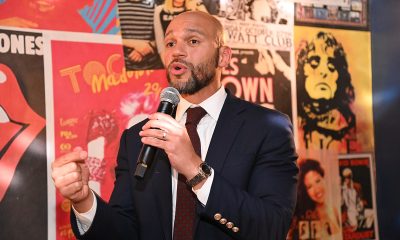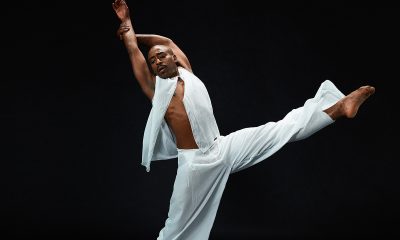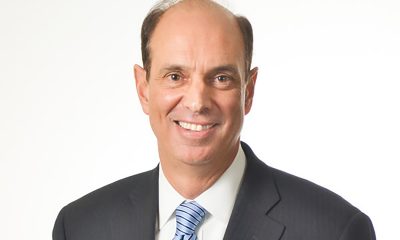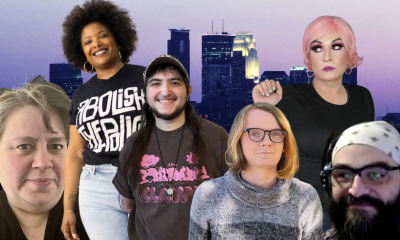Local
LGBT witnesses back D.C. anti-bullying bills
ACLU says legislation could violate students’ civil liberties

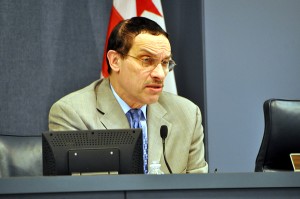
D.C. Mayor-elect Vincent Gray presided over a hearing this week on two bills to address bullying and harassment in public schools. (Washington Blade file photo by Michael Key)
Nine witnesses representing the LGBT community expressed strong support for two bills aimed at prohibiting bullying in D.C. schools, public libraries and parks during a City Council hearing this week.
The LGBT witnesses, including two gay and one transgender student, gave examples of anti-LGBT bullying and harassment in the D.C. public school system. They joined other witnesses in noting that existing public school policies pertaining to bullying were not strong enough to adequately address the problem.
“The District of Columbia has been a pioneer on issues such as nondiscrimination in schools and yet is one of only a handful of jurisdictions in this country without an anti-bullying law,” said Alison Gill, a public policy associate with the Gay, Lesbian & Straight Education Network (GLSEN).
Gill and other witnesses pointed to the 2009 D.C. Youth Risk Behavior Survey, a federally funded study that includes data on lesbian, gay, and bisexual youth. Among other things, the study found that 29 percent of LGB teens in the city’s middle schools and high schools have attempted suicide. The study did not collect data on transgender students.
Anti-gay bullying and harassment are believed to have played a large role in prompting the youth to consider suicide, Gill and other witnesses said.
D.C. Mayor-elect Vincent Gray presided over the hearing in his current role as City Council Chair and chair of the Council’s Committee of the Whole. He takes office as mayor on Jan. 2.
The Committee of the Whole and the Committee on Libraries, Parks and Recreation, which is chaired by Council member Harry Thomas (D-Ward 5), conducted a joint hearing on the two bills, the Bullying Prevention Act of 2010 and the Harassment and Intimidation Prevention Act of 2010.
Gray said after the hearing that the two bills would be combined following a markup hearing that he predicted would take place sometime next year.
“I don’t see the evidence of a comprehensive policy existing in the city on this,” Gray told reporters after the hearing, saying a combined version of the two bills would go a long way to address the problem of bullying.
The Bullying Prevention Act, which Gray and Council member Michael Brown (I-At-Large) introduced in April, calls for developing a “model policy prohibiting bullying, harassment and intimidation in the District of Columbia public schools.” It requires all public schools to adopt an anti-bullying and harassment policy at least as strong as the model policy defined in the bill.
The Harassment and Intimidation Prevention Act, which was introduced in October by Thomas, calls for developing similar policies banning bullying and harassment but expands the coverage to D.C. public charter schools, the city’s public libraries and parks and recreation centers, and to the University of the District of Columbia.
Thomas’s bill also covers bullying and harassment conducted through “electronic communication,” such as e-mail or social networking sites.
The bill defines harassment, intimidation or bullying as “any gesture or written, verbal or physical act, including electronic communication, that is reasonably perceived as being motivated either by any actual or perceived characteristic, such as race, color, religion, ancestry, national origin, gender, sexual orientation, gender identity and expression, or a mental, physical or sensory handicap, or by any other distinguishing characteristic…”
It says an act of bullying, intimidation or harassment would be one that “a reasonable person should know, under the circumstances, will have the effect of harming a student or damaging the student’s property, or placing a student in reasonable fear of harm to his person or damage to his property.”
The definition further states that the act in question “has the effect of insulting or demeaning any student or group of students in such as way as to cause substantial disruption in, or substantial interference with, the orderly operation of a school, university, recreation facility, or library.”
Arthur Spitzer, legal director of the D.C. chapter of the ACLU, said the ACLU supports the concept of anti-bullying legislation but has concerns that the wording of the two proposed bills in D.C. could violate students’ civil liberties.
“What does it mean by harming a student?” he said of part of the definition in one of the bills. “Does that mean hurting a student’s feelings? If a student comes in and says I feel very harmed by the fact that so and so said I was a crappy athlete … That’s not bullying,” he said.
“So I think the language here needs to be tightened up.”
Spitzer told the Washington Post that it would be “perfectly legitimate” for a student to say he or she thinks homosexual conduct is “against the word of God.” Although such a comment might hurt the feelings of a gay student, that should not be defined as bullying but instead as “an opinion that every student has a right to express,” he told the Post.
GLSEN spokesperson Daryl Presgraves said GLSEN believes the language in the two D.C. bills would not violate students’ civil liberties. But he said GLSEN and others supporting the bills would be open to making changes if the ACLU demonstrates that the language would prevent students from expressing their opinions in a way that doesn’t cross the line of true bullying and harassment.
Trina Cole, a male to female transgender student who graduated in 2009 from D.C.’s Dunbar Senior High School, told the hearing she was victimized by harassment and intimidation that went far beyond hurting her feelings.
“At school, I was often both verbally and physically abused,” she said. “We need to have more support in our schools so that the bullying that I went through does not continue to happen every day.”
Cole testified on behalf of Metro Teen AIDS, a D.C.-based group that provides services to LGBT youth at risk for HIV.
Ginnie Cooper, chief librarian for the city’s public library system; Jesus Auguirre, director of the Department of Parks and Recreation; and Mark Farley, vice president of the Office of Human Resources for the University of the District of Columbia each expressed strong support for the two bills.
A spokesperson for the D.C. public schools did not appear before the hearing. Gray said the person expected to testify had a scheduling conflict and was expected to submit written testimony within the next week.
Gay activist and ANC commissioner-elect Bob Summersgill noted that the D.C. Public Schools currently use city-adopted regulations pertaining to student discipline as a basis for addressing bullying and harassment of students. A provision of the city’s Human Rights Act and a March 2000 directive by the then D.C. schools superintendent are also used as a patchwork of rules or laws to address bullying.
“The limitations in all of these laws and regulations are the implementation and enforcement,” Summersgill told the hearing. “If a school fails to make clear that bullying will not be tolerated, or if a teacher or staff fails to intervene when bullying occurs, or if a teacher or staff makes a derogatory comment or through inaction shows their distaste for some group, then they are tacitly giving approval of bullying and harassment,” he said.
Michael Musante, an official with Friends of Choice in Urban Schools (FOCUS), which advocates for D.C.’s public charter schools, said the group did not support the proposed legislation, saying charter schools were formed as semi-autonomous institutions independent from city control.
He said many charter schools already have anti-bullying polices and said charter schools prefer to address bullying through school disciplinary codes rather than “one-size-fits-all legislation.”
Gray and Council member Michael Brown, speaking after the hearing, said they favor including charter schools in the legislation before the Council.
“They have over 30,000 of our kids being educated with public money,” Gray said of the charter schools.
Others who testified in favor of the bills at the hearing included Renee Reopell, program associate for the D.C. LGBT community center; Peter Rosenstein, LGBT community activist; Rick Rosendall, vice president of the Gay & Lesbian Activists Alliance; Bill Briggs, executive director of Metro D.C. Parents, Families and Friends of Lesbians and Gays (PFLAG); and Andrew Barnett, executive director of Sexual Minority Youth Assistance League (SMYAL).
Virginia
Spanberger signs bill that paves way for marriage amendment repeal referendum
Proposal passed in two successive General Assembly sessions

Virginians this year will vote on whether to repeal a state constitutional amendment that defines marriage as between a man and a woman.
Democratic Gov. Abigail Spanberger on Friday signed state Del. Laura Jane Cohen (D-Fairfax County)’s House Bill 612, which finalized the referendum’s language.
The ballot question that voters will consider on Election Day is below:
Question: Should the Constitution of Virginia be amended to: (i) remove the ban on same-sex marriage; (ii) affirm that two adults may marry regardless of sex, gender, or race; and (iii) require all legally valid marriages to be treated equally under the law?
Voters in 2006 approved the Marshall-Newman Amendment.
Same-sex couples have been able to legally marry in Virginia since 2014. Former Gov. Glenn Youngkin, who is a Republican, in 2024 signed a bill that codified marriage equality in state law.
Two successive legislatures must approve a proposed constitutional amendment before it can go to the ballot.
A resolution to repeal the Marshall-Newman Amendment passed in the General Assembly in 2025. Lawmakers once again approved it last month.
“20 years after Virginia added a ban on same-sex marriage to our Constitution, we finally have the chance to right that wrong,” wrote Equality Virginia Executive Director Narissa Rahaman on Friday in a message to her group’s supporters.
Virginians this year will also consider proposed constitutional amendments that would guarantee reproductive rights and restore voting rights to convicted felons who have completed their sentences.
District of Columbia
D.C. non-profits find creative ways to aid the unhoused amid funding cuts
City’s poor economic mobility makes it easier to slip into homelessness
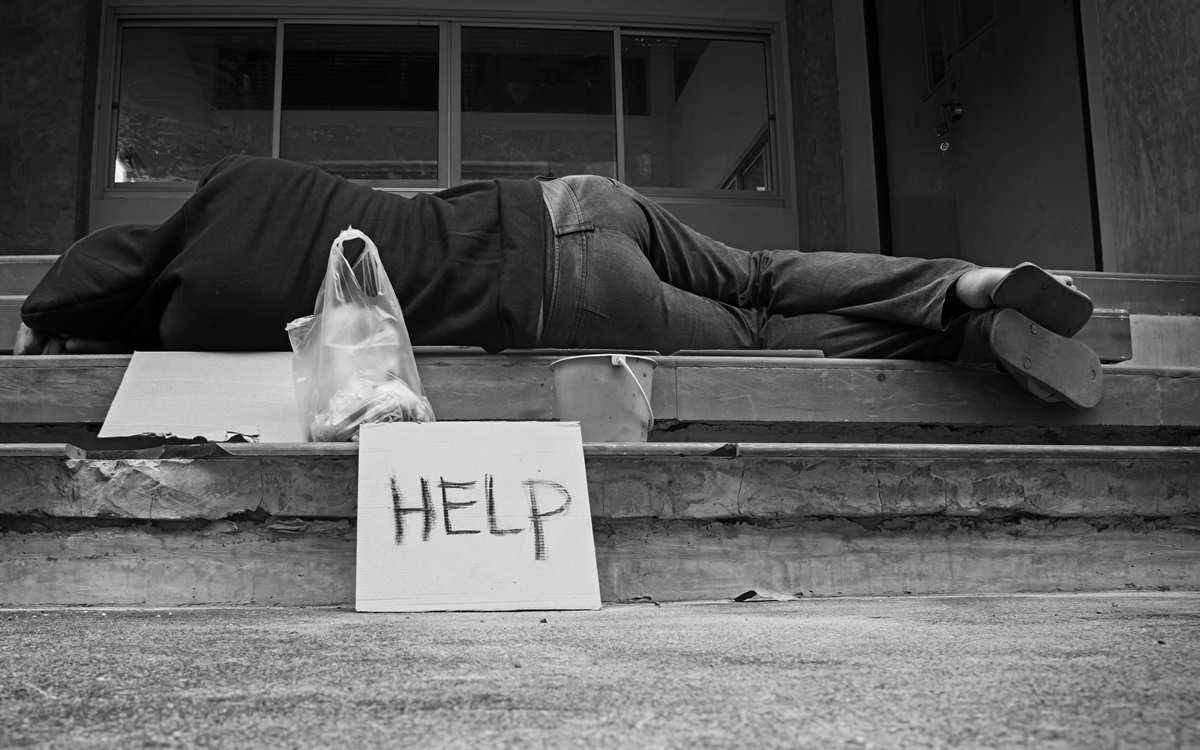
Homelessness is unlikely to disappear entirely, but it can be minimized and controlled.
That principle guides Everyone Home Executive Director Karen Cunningham’s approach to homeless support and prevention in D.C.
“There’s always going to be some amount of people who have a crisis,” Cunningham said. “The goal is that if they become homeless, [it’s] rare, brief and non-recurring. And in order for that to be the case, we need to have steady investments in programs that we know work over time.”
Making those investments has proven to be an unprecedented challenge, however. Cunningham said non-profits and other organizations like Everyone Home are grappling with government funding cuts or stalls that threaten the work they do to support D.C.’s homeless population.
Despite a 9% decrease in homelessness from 2024 to 2025, advocates worry that stagnant funding will make that progress hard to sustain. Furthermore, D.C. has the worst unemployment rate in the country at 6.7% as of December. The city’s poor economic mobility makes it easier for people to slip into homelessness and harder to break free of it.
There’s a way forward, Cunningham said, but it’s going to take a lot of perseverance and creative solutions from those willing to stay in the fight.
Fighting through setbacks
Reduced funding from the city government has shifted the way Everyone Home operates.
In D.C.’s fiscal year 2026 budget proposal, homeless services and prevention programs saw stalled growth or financial reductions. Even just a few years ago, Cunningham said Everyone Home received a large influx of vouchers to help people who needed long-term supportive housing. The vouchers allowed the non-profit to break people free of the homeless cycle and secure stable housing.
However, those vouchers are scarce these days. Cunningham said the city is investing less in multi-year programs and more in programs that offer preventative and upfront support.
She said this reality has forced Everyone Home to stop operating its Family Rapid Rehab program, which helps families leave shelters and transition into permanent housing. Current funds couldn’t withstand the size of the program and Cunningham said very few organizations can still afford to run similar programs.
The Family Homelessness Prevention program, however, is thriving and expanding at Everyone Home due to its short-term nature. It provides families with 90-day support services to help them get back on track and secure stable finances and housing.
Everyone Home also offers a drop-in day center, where they provide people with emergency clothing, laundry, and meals, and has a street outreach team to support those who are chronically homeless and offer services to them.
Inconsistencies in financial support have created challenges in providing the necessary resources to those struggling. It’s led non-profits like Everyone Home to get creative with their solutions to ensuring no one has recurring or long spouts of homelessness.
“It’s really a sustained investment in these programs and services that can allow us to chip away, because if you put all these resources in and then take your foot off the gas, there’s always people entering the system,” Cunningham said. “And so we have to always be moving people out into housing.”
Getting people in and out of the homeless system isn’t easy due to D.C.’s struggle with providing accessible and affordable housing, D.C. Policy Center executive director Yesim Sayin said in a Nov. 16 Washington Blade article.
Sayin said that D.C.’s construction tailors to middle or upper class people who live in the city because work brought them there, but it excludes families and D.C. natives who may be on the verge of homelessness and have less geographic mobility.
Building more and building smarter ensures D.C.’s low-income population aren’t left behind and at risk of becoming homeless, Sayin said.
That risk is a common one in D.C. given its low economic mobility. Residents have less room to financially grow given the city’s high cost of living, making vulnerable communities more prone to homelessness.
With funding cuts for long-term programs, preventative programs have proven to be vital in supporting the homeless population. When someone becomes homeless, it can have a snowball effect on their life. They aren’t just losing a house –– they may lose their job, access to reliable transportation and food for their family.
Cunningham said resources like the Family Homelessness Prevention program allows people to grow and stabilize before losing crucial life resources.
“Helping people keep what they have and to try to grow that as much as possible is really important where there aren’t a lot of opportunities…for people to increase their income,” Cunningham said.
Through all the funding cuts and reduced services, D.C.’s homeless support organizations are still finding a path forward –– a path that many residents and families rely on to survive.
Pushing forward
Local non-profits and organizations like Everyone Home are the backbone of homeless support when all other systems fail.
When the White House issued an executive order directing agencies to remove homeless encampments on federal land, Coalition For The Homeless provided ongoing shelter to those impacted.
“We were asked by our funders to open two shelters at the time of the encampment policy announcement,” Lucho Vásquez, executive director of Coalition For The Homeless, said. “We opened the shelters on the same day of the request and have been housing 100 more people who are unhoused each night since August.”
This was achieved even after Coalition faced “severe cuts in funding for supportive and security services,” according to Vásquez. Staff members have taken on additional responsibilities to make up for the loss in security coverage and supportive services with no increase in pay, but Vásquez said they’re still trying to fill gaps left by the cuts.
Coalition offers free transitional housing, single room occupancy units and affordable apartments to people who were unhoused.
Coalition For The Homeless isn’t the only non-profit that’s had to step up its services amid dwindling resources. Thrive D.C. provides hot meals, showers, and winter clothes, which is especially important during the winter months.
Pathways to Housing D.C. offers housing services for people regardless of their situation or condition. Its “Housing First” teams house people directly from the streets, and then evaluate their mental and physical health, employment, addiction status, and education challenges to try to integrate them back into the community.
Covenant House is a homeless shelter for youth ages 18-24. They provide resources and shelter for youth “while empowering young people in their journey to independence and stability,” its website reads. Through its variety of programs, Friendship Place ended or prevented homelessness, found employment and provided life-changing services for more than 5,400 people.
These groups have made a huge local difference with little resources, but Cunningham said there are more ways for people to support those experiencing homelessness if they’re strapped for time or money. Aside from donating and volunteering, she said even simply showing compassion toward people who are struggling can go a long way.
Cunningham said compassion is something that’s been lost in the mainstream, with politicians and news anchors regularly directing hostile rhetoric toward homeless populations. But now more than ever, she said caring and understanding for fellow community members is key to moving forward and lifting those in need up.
“People sometimes feel invisible or that there’s a sense of hostility,” Cunningham said. “I think all of us can at least do that piece of recognizing people’s humanity.”
(This article is part of a national initiative exploring how geography, policy, and local conditions influence access to opportunity. Find more stories at economicopportunitylab.com.)
District of Columbia
D.C. bar Rush facing eviction on charge of failing to pay rent
Landlord says $201,324 owed in back payments, late fees
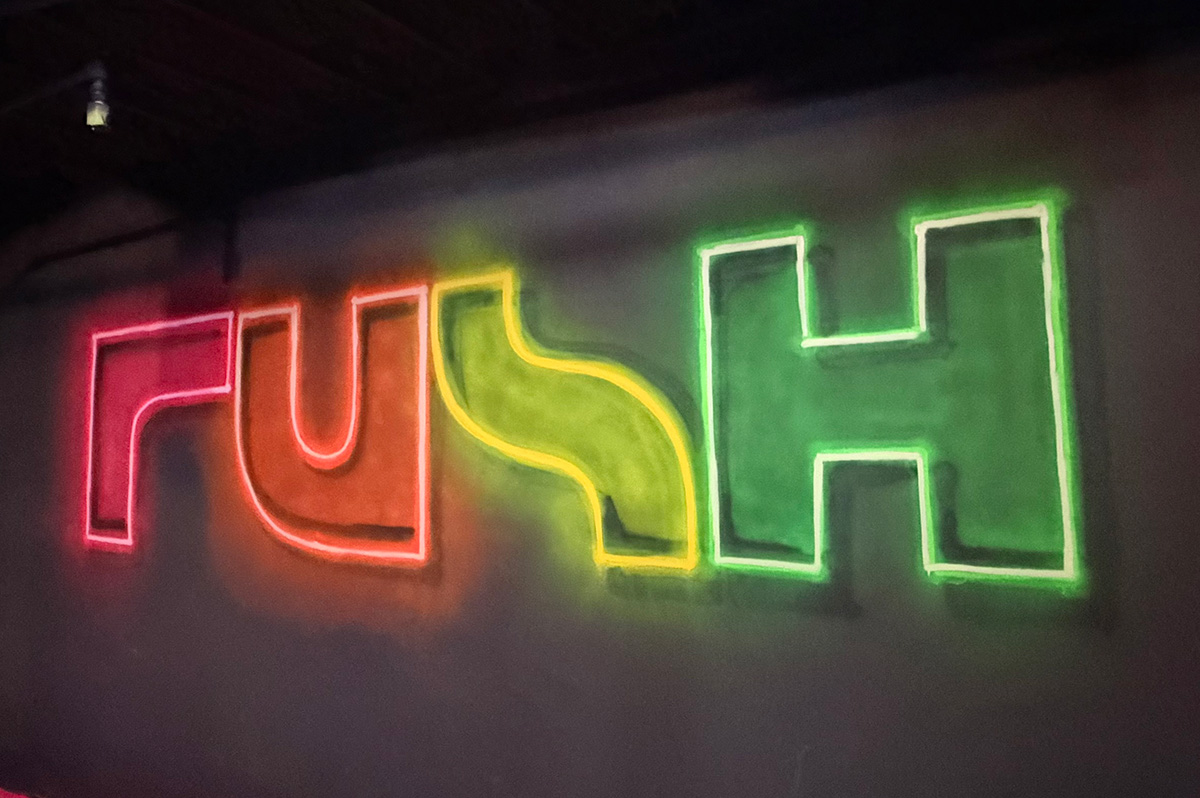
The owners of the building at 14th and U Streets, N.W. where D.C.’s newest LGBTQ bar and nightclub Rush opened on Dec. 5, 2025, filed a complaint in D.C. Superior Court on Feb. 3 seeking Rush’s eviction on grounds that the bar has failed to pay its required rent since last May.
According to the court filing by building owners Thomas and Ioanna Tsianakas Family Trust and Thomas Tsianakas Trustee, Rush owes $141,338.18 in back rent, $19,086.19 for utilities, and $40,900 in late fees, coming to a total of $201,324.37.
Rush owner Jackson Mosley didn’t immediately respond to a Feb. 5 phone message from the Washington Blade seeking comment on the court filing seeking his eviction from the building located at 200114th Street, N.W., with its entrance around the corner on U Street.
WUSA 9 TV news reported in a Feb. 5 broadcast that Mosley said he “doesn’t see why the eviction notice is news and called it a ‘formality.’” The WUSA report adds that Mosley said he and the Rush landlord “have no bad blood” and if the action did reach the point of eviction he would file for Chapter 11 bankruptcy to restructure the lease and his debts.
The eviction court filing follows a decision by the city’s Alcoholic Beverage and Cannabis Board on Dec. 17 to suspend Rush’s liquor license on grounds that its payment check for the liquor licensing fee was “returned unpaid.” The liquor board reissued the license three days later after Mosley paid the fee with another check
He told the Blade at the time that the first check did not “bounce,” as rumors in the community claimed. He said he made a decision to put a “hold” on the check so that Rush could change its initial decision to submit a payment for the license for three years and instead to arrange for a lower payment for just one year at a time.
Around that same time several Rush employees posted social media messages saying the staff was not paid for the bar’s first month’s pay period. Mosley responded by posting a message on the Rush website saying employees were not paid because of a “tax related mismatch between federal and District records,” which, among other things, involved the IRS.
“This discrepancy triggered a compliance hold within our payroll system,” his statement said. “The moment I became aware of the issue I immediately engaged our payroll provider and began working to resolve it,” he said.
But WUSA 9 reports in its Feb. 5 broadcast about the eviction issue that at least some of the now former employees say they still have not been paid since their first paycheck failed to come on Dec. 15.
Superior Court online records for the eviction case show that a “Remote Initial Hearing” for the case has been scheduled for March 30 before a Landlord & Tenant Judge.





